- Home
- Carolyn Wells
The Man Who Fell Through the Earth
The Man Who Fell Through the Earth Read online
THE MAN WHO FELL THROUGH THE EARTH
by
CAROLYN WELLS
Author of "The Room With the Tassels," "Faulkner's Folly," etc.
New YorkGeorge H. Doran Company
Copyright, 1919,By George H. Doran CompanyPrinted in the United States of America
THIS BOOK IS DEDICATED TO BLANCHE CLARK APOSTLE OF THE FINE ART OF FRIENDSHIP
CONTENTS
CHAPTER PAGE I. Moving Shadow-Shapes 11 II. Jenny's Version 27 III. The Elevator 42 IV. The Black Squall 58 V. Olive Raynor 74 VI. Clews 90 VII. Hudson's Errand 107 VIII. The Man Who Fell Through The Earth 122 IX. The Man in Boston 138 X. Penny Wise and Zizi 153 XI. Case Rivers 169 XII. The Link 185 XIII. Olive's Adventure 203 XIV. Where is Manning? 216 XV. Wise's Pipe Dream 232 XVI. The Snowflake 248 XVII. Zizi's Hunch 264 XVIII. Clear as Crystal 280
THE MAN WHO FELL THROUGH THE EARTH
CHAPTER I Moving Shadow-Shapes
One of the occasions when I experienced "that grand and glorious feeling"was when my law business had achieved proportions that justified myremoval from my old office to new and more commodious quarters. Iselected a somewhat pretentious building on Madison Avenue betweenThirtieth and Fortieth Streets, and it was a red-letter day for me when Imoved into my pleasant rooms on its top floor.
The Puritan Trust Company occupied all of the ground floor and there werealso some of the private offices of that institution on the top floor, aswell as a few offices to be let.
My rooms were well located and delightfully light, and I furnished themwith care, selecting chairs and desks of a dignified type, and rugs ofappropriately quiet coloring. I also selected my stenographer with care,and Norah MacCormack was a red-haired piece of perfection. If she had aweakness, it was for reading detective stories, but I condoned that, forin my hammocky moods I, too, dipped into the tangled-web school offiction.
And, without undue conceit, I felt that I could give most specimens ofthe genus Sherlock cards and spades and beat them at their own game ofdeduction. I practiced it on Norah sometimes. She would bring me a veilor glove of some friend of hers, and I would try to deduce the friend'straits of character. My successes and failures were about fifty-fifty,but Norah thought I improved with practice, and, anyway, it exercised myintelligence.
I had failed to pass examination for the army, because of a defect,negligible, it seemed to me, in my eyesight. I was deeply disappointed,but as the law of compensation is usually in force, I unexpectedly provedto be of some use to my Government after all.
Across the hall from me was the private office of Amos Gately, thePresident of the Puritan Trust Company, and a man of city-widereputation. I didn't know the great financier personally, but everyoneknew of him, and his name was a synonym for all that is sound, honorable,and philanthropic in the money mart. He was of that frequently seen type,with the silver gray hair that so becomingly accompanies deep-set darkeyes.
And yet, I had never seen Mr. Gately himself. My knowledge of him wasgained from his frequent portraiture in the papers or in an occasionalmagazine. And I had gathered, in a vague way, that he was a connoisseurof the fine arts, and that his offices, as well as his home, werepalatial in their appointments.
I may as well admit, therefore, that going in and out of my own rooms Ioften looked toward his door, in hopes that I might get a glimpse, atleast, of the treasures within. But so far I had not done so.
To be sure, I had only occupied my own suite about a week and then againMr. Gately was not always in his private offices during business hours.Doubtless, much of the time he was down in the banking rooms.
There was a yellow-haired stenographer, who wore her hair in ear-muffs,and who was, I should say, addicted to the vanity-case. This youngperson, Norah had informed me, was Jenny Boyd.
And that sums up the whole of my intimate knowledge of Amos Gately--untilthe day of the black snow squall!
I daresay my prehistoric ancestors were sun-worshipers. At any rate, I amperfectly happy when the sun shines, and utterly miserable on a gloomyday. Of course, after sunset, I don't care, but days when artificiallight must be used, I get fidgety and am positively unable to concentrateon any important line of thought.
And so, when Norah snapped on her green-shaded desk light inmid-afternoon, I impulsively jumped up to go home. I could standelectrically lighted rooms better in my diggings than in thework-compelling atmosphere of my office.
"Finish that bit of work," I told my competent assistant, "and then gohome yourself. I'm going now."
"But it's only three o'clock, Mr. Brice," and Norah's gray eyes looked upfrom the clicking keys.
"I know it, but a snow storm is brewing,--and Lord knows there's snowenough in town now!"
"There is so! I'm thinking they won't get the black mountains out of theside streets before Fourth of July,--and the poor White Wings workingthemselves to death!"
"Statistics haven't yet proved that cause of death prevalent amongsnow-shovelers," I returned, "but I'm pretty sure there's more chance forit coming to them!"
I hate snow. For the ocular defect that kept me out of the army iscorrected by not altogether unbecoming glasses, but when these aremoistened or misted by falling snow, I am greatly incommoded. So Idetermined to reach home, if possible, before the squall which was soindubitably imminent.
I snugged into my overcoat, and jammed my hat well down on my head, forthe wind was already blowing a gale.
"Get away soon, Norah," I said, as I opened the door into the hall, "andif it proves a blizzard you needn't show up tomorrow."
"Oh, I'll be here, Mr. Brice," she returned, in her cheery way, andresumed her clicking.
The offices of Mr. Gately, opposite mine, had three doors to the hall,meaning, I assumed, three rooms in his suite.
My own door was exactly opposite the middle one of the three. On that wasthe number two. To its left was number one, and to its right, numberthree.
Each of these three doors had an upper panel of thick, clouded glass,and, as the hall was not yet lighted and Mr. Gately's rooms were, I couldsee quite plainly the shadows of two heads on the middle door,--the doornumbered two.
Perhaps I am unduly curious, perhaps it was merely a natural interest,but I stood still a moment, outside my own door, and watched the twoshadowed heads.
The rippled clouding of the glass made their outlines somewhat vague, butI could distinguish the fine, thick mane of Amos Gately, as I had sooften seen it pictured. The other was merely a human shadow with nostriking characteristics.
It was evident their interview was not amicable. I heard a loud,explosive "No!" from one or other of them, and then both figures rose andthere was a hand-to-hand struggle. Their voices indicated a desperatequarrel, though no words were distinguishable.
And then, as I looked, the shadows bl
urred into oneanother,--swayed,--separated, and then a pistol shot rang out, followedimmediately by a woman's shrill scream.
Impulsively I sprang across the hall, and turned the knob of door numbertwo,--the one opposite my own door, and the one through which I had seenthe shadowed actions.
But the door would not open.
I hesitated only an instant and then hurried to the door next on theright, number three.
This, too, was fastened on the inside, so I ran back to the only otherdoor, number one,--to the left of the middle door.
This door opened at my touch, and I found myself in the first of AmosGately's magnificent rooms.
Beyond one quick, admiring glance, I paid no attention to the beautifulappointments, and I opened the communicating door into the next or middleroom.
This, like the first, contained no human being, but it was filled withthe smoke and the odor of a recently fired pistol.
I looked around, aghast. This was the room where the altercation hadtaken place, where two men had grappled, where a pistol had been fired,and moreover, where a woman had screamed. Where were these people?
In the next room, of course, I reasoned.
With eager curiosity, I went on into the third room. It was empty.
And that was all the rooms of the suite.
Where were the people I had seen and heard? That is, I had seen theirshadows on the glass door, and human shadows cannot appear without peopleto cast them. Where were the men who had fought? Where was the woman whohad screamed? And who were they?
Dazed, I went back through the rooms. Their several uses were clearenough. Number one was the entrance office. There was an attendant'sdesk, a typewriter, reception chairs, and all the effects of the firststage of an interview with the great man.
The second office, beyond a doubt, was Mr. Gately's sanctum. A stunningmahogany table-desk was in the middle of the floor, and a large,unusually fine swivel-chair stood behind it. On the desk, things weresomewhat disordered. The telephone was upset, the papers pushed into anuntidy heap, a pen-tray overturned, and a chair opposite the big deskchair lay over on its side, as if Mr. Gately's visitor had risenhurriedly. The last room, number three, was, clearly, the very holy ofholies. Surely, only the most important or most beloved guests werereceived in here. It was furnished as richly as a royal salon, yet all inmost perfect taste and quiet harmony. The general coloring of draperiesand upholstery was soft blue, and splendid pictures hung on the wall.Also, there was a huge war map of Europe, and indicative pins stuck in itproved Mr. Gately's intense interest in the progress of events overthere.
But though tempted to feast my eyes on the art treasures all about, Ieagerly pursued my quest for the vanished human beings I sought.
There was no one in any of these three rooms, and I could see no exit,save into the hall from which I had entered. I looked into three or fourcupboards, but they were full of books and papers, and no sign of ahidden human being, alive or dead, could I find.
Perhaps the strangeness of it all blunted my efficiency. I had alwaysflattered myself that I was at my best in an emergency, but all previousemergencies in which I had found myself were trivial and unimportantcompared with this.
I felt as if I had been at a moving picture show. I had seen, as on thescreen, a man shot, perhaps killed, and now all the actors had vanishedas completely as they do when the movie is over.
Then, for I am not entirely devoid of conscience, it occurred to me thatI had a duty,--that it was incumbent upon me to report to somebody. Ithought of the police, but was it right to call them when I had so vaguea report to make? What could I tell them? That I had seen shadowsfighting? Heard a woman scream? Smelled smoke? Heard the report of apistol? A whimsical thought came that the report of the pistol was theonly definite report I could swear to!
Yet the whole scene was definite enough to me.
I had seen two men fighting,--shadows, to be sure, but shadows of realmen. I had heard their voices raised in dissension of some sort, I hadseen a scuffle and had heard a shot, of which I had afterward smelled thesmoke, and,--most incriminating of all,--I had heard a woman's scream. Ascream, too, of terror, as for her life!
And then, I had immediately entered these rooms, and I had found themempty of all human presence, but with the smoke still hanging low, toprove my observations had been real, and no figment of my imagination.
I believed I had latent detective ability. Well, surely here was a chanceto exercise it!
What more bewildering mystery could be desired than to witness ashooting, and, breaking in upon the scene, to find no victim, nocriminal, and no weapon!
I hunted for the pistol, but found no more trace of that than of the handthat had fired it.
My brain felt queer; I said to myself, over and over, "a fight, a shot, ascream! No victim, no criminal, no weapon!"
I looked out in the hall again. I had already looked out two or threetimes, but I had seen no one. However, I didn't suppose the villain andhis victim had gone down by the elevator or by the stairway.
But where were they? And where was the woman who had screamed?
Perhaps it was she who had been shot. Why did I assume that Mr. Gatelywas the victim? Could not he have been the criminal?
The thought of Amos Gately in the role of murderer was a little tooabsurd! Still, the whole situation was absurd.
For me, Tom Brice, to be involved in this baffling mystery was the heightof all that was incredible!
And yet, was I involved? I had only to walk out and go home to be out ofit all. No one had seen me and no one could know I had been there.
And then something sinister overcame me. A kind of cold dread of thewhole affair; an uncanny feeling that I was drawn into a fearful web ofcircumstances from which I could not honorably escape, if, indeed, Icould escape at all. The three Gately rooms, though lighted, felt darkand eerie. I glanced out of a window. The sky was almost black andscattering snowflakes were falling. I realized, too, that though theplace was lighted, the fixtures were those great alabaster bowls, and, asthey hung from the ceiling, they seemed to give out a ghostly radiancethat emphasized the strange silence.
For, in my increasingly nervous state, the silence was intensified and itseemed the silence of death,--not the mere quiet of an empty room.
I pulled myself together, for I had not lost all sense of my duty. I_must_ do something, I told myself, sternly,--but what?
My hand crept toward the telephone that lay, turned over on its side, onMr. Gately's desk.
But I drew back quickly, not so much because of a disinclination to touchthe thing that had perhaps figured in a tragedy but because of a diminstinct of leaving everything untouched as a possible clew.
Clew! The very word helped restore my equilibrium. There had been a crimeof some sort,--at least, there had been a shooting, and I had been aneye-witness, even if my eyes had seen only shadows.
My role, then, was an important one. My duty was to tell what I had seenand render any assistance I could. But I wouldn't use that telephone. Itmust be out of order, anyway, or the operator downstairs would be lookingafter it. I would go back to my own office and call up somebody. As Icrossed the hall, I was still debating whether that somebody would betterbe the police or the bank people downstairs. The latter, I decided, forit was their place to look after their president, not mine.
I found Norah putting on her hat. The sight of her shrewd gray eyes andintelligent face caused an outburst of confidence, and I told her thewhole story as fast as I could rattle it out.
"Oh, Mr. Brice," she exclaimed, her eyes wide with excitement, "let me goover there! May I?"
"Wait a minute, Norah: I think I ought to speak to the bank people. Ithink I'll telephone down and ask if Mr. Gately is down there. You knowit may not have been Mr. Gately at all, whose shadow I saw----"
"Ooh, yes, it was! You couldn't mistake his head, and, too, who elsewould be in there? Please, Mr. Brice, wait just a minute before youtelephone,--let me take one look round,-
-you don't want to make a--tolook foolish, you know."
She had so nearly warned me against making a fool of myself, that I tookthe hint, and I followed her across the hall.
She went in quickly at the door of room number one. One glance around itand she said, "This is the first office, you see: callers come here, thesecretary or stenographer takes their names and all that, and shows theminto Mr. Gately's office."
As Norah spoke she went on to the second room. Oblivious to its grandeurand luxury, she gave swift, darting glances here and there and saidpositively: "Of course, it was Mr. Gately who was shot, and by a womantoo!"
"The woman who screamed?"
"No: more likely not. I expect the woman who screamed was hisstenographer. I know her,--at least, I've seen her. A little doll-facedjig, who belongs about third from the end, in the chorus! Be sure she'dscream at the pistol shot, but the lady who fired the shot wouldn't."
"But I saw the scrimmage and it was a man who shot."
"Are you sure? That thick, clouded glass blurs a shadow beyondrecognition."
"What makes you think it was a woman, then?"
"This," and Norah pointed to a hatpin that lay on the big desk.
It was a fine-looking pin, with a big head, but when I was about to pickit up Norah dissuaded me.
"Don't touch it," she warned; "you know, Mr. Brice, we've really no righthere and we simply must not touch anything."
"But, Norah," I began, my common sense and good judgment having returnedto me with the advent of human companionship, "I don't want to doanything wrong. If we've no right here, for Heaven's sake, let's getout!"
"Yes, in a minute, but let me think what you ought to do. And, oh, do letme take a minute to look round!"
"No, girl; this is no time to satisfy your curiosity or, to enjoy a sightof these----"
"Oh, I don't mean that! But I want to see if there isn't some clew orsome bit of evidence to the whole thing. It is too weird! too impossiblethat three people should have disappeared into nothingness! Where arethey?"
Norah looked in the same closets I had explored; she drew aside windowdraperies and portieres, she hastily glanced under desks and tables, notso much, I felt sure, in expectation of finding anyone, as with a generalidea of searching the place thoroughly.
She scrutinized the desk fittings of the stenographer.
"Everything of the best," she commented, "but very little real work doneup here. I fancy these offices of Mr. Gately's are more for privateconferences and personal appointments than any real business matters."
"Which would account for the lady's hatpin," I observed.
"Yes; but how did they get out? You looked out in the hall, at once, yousay?"
"Yes; I came quickly through these three rooms, and then looked out intothe hall at once, and there was no elevator in sight nor could I seeanyone on the stairs."
"Well, there's not much to be seen here. I suppose you'd better call upthe bank people. Though if they thought there was anything queer they'dbe up here by this time."
I left Norah in Mr. Gately's rooms while I went back to my own office andcalled up the Puritan Trust Company.
A polite voice assured me that they knew nothing of Mr. Gately'swhereabouts at that moment, but if I would leave a message he wouldultimately receive it.
So, then, I told them, in part, what had happened, or, rather, what Ibelieved had happened, and still a little unconcerned, the polite managreed to send somebody up.
"Stuffy people!" I said to Norah, as I returned to the room she was in."They seemed to think me officious."
"I feared they would, Mr. Brice, but you had to do it. There's no doubtMr. Gately left this room in mad haste. See, here's his personalcheckbook on his desk, and he drew a check today."
"Nothing remarkable in his drawing a check," I observed, "but decidedlypeculiar to leave his checkbook around so carelessly. As you say, Norah,he left in a hurry."
"But how did he leave?"
"That's the mystery; and I, for one, give it up. I'm quite willing towait until some greater brain than mine works out the problem."
"But it's incomprehensible," Norah went on; "where's Jenny?"
"For that matter," I countered, "where's Mr. Gately? Where's his angryvisitor, male or female? and, finally, where's the pistol that made thesound and smoke of which I had positive evidence?"
"We may find that," suggested Norah, hopefully.
But careful search failed to discover any firearms, as it had failed toreveal the actors of the drama.
Nor did the representative from the bank come up at once. This seemedqueer, I thought, and with a sudden impulse to find out something, Ideclared I was going down to the bank myself.
"Go on," said Norah, "I'll stay here, for I must know what they find outwhen they do come."
I went out into the hall and pushed the "Down" button of the elevator.
"Be careful," Norah warned me, as the car was heard ascending, "say verylittle, Mr. Brice, except to the proper authorities. This may be aterrible thing, and you mustn't get mixed up in it until you know moreabout it. You were not only the first to discover the disappearance,--butyou and I are apparently the only ones in this corridor who know of ityet, we may be----"
"Suspected of the abduction of Amos Gately! Hardly! Don't let yourdetective instinct run away with you Norah!"
And then the elevator door slid open and I got into the car.

 The Deep Lake Mystery
The Deep Lake Mystery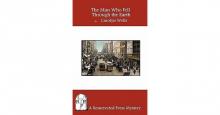 The Man Who Fell Through the Earth
The Man Who Fell Through the Earth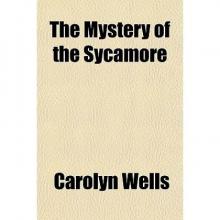 The Mystery of the Sycamore
The Mystery of the Sycamore The Mystery Girl
The Mystery Girl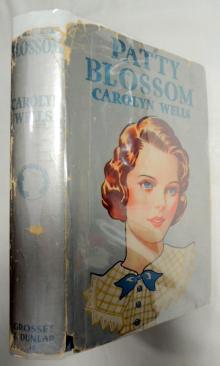 Patty Blossom
Patty Blossom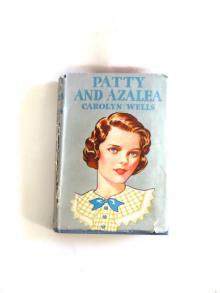 Patty and Azalea
Patty and Azalea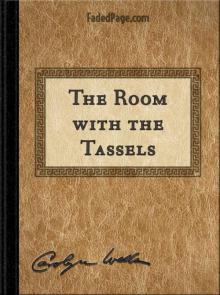 The Room with the Tassels
The Room with the Tassels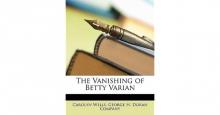 The Vanishing of Betty Varian
The Vanishing of Betty Varian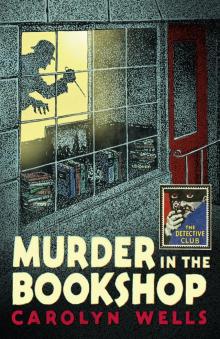 Murder in the Bookshop
Murder in the Bookshop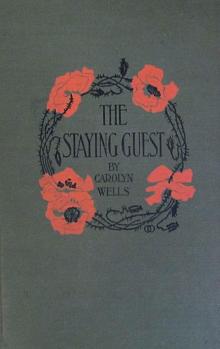 The Staying Guest
The Staying Guest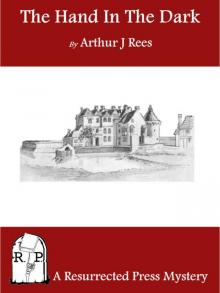 The Curved Blades
The Curved Blades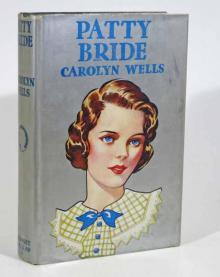 Patty—Bride
Patty—Bride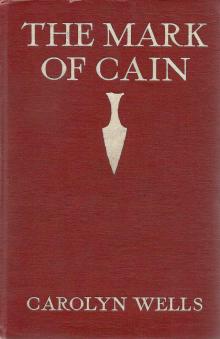 The Mark of Cain
The Mark of Cain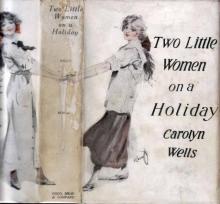 Two Little Women on a Holiday
Two Little Women on a Holiday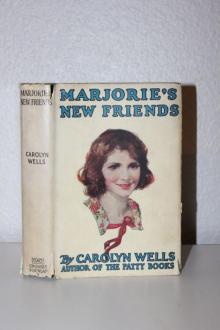 Marjorie's New Friend
Marjorie's New Friend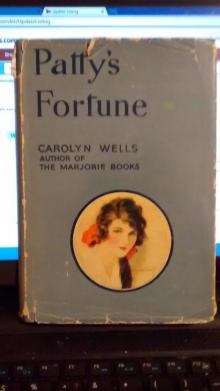 Patty's Fortune
Patty's Fortune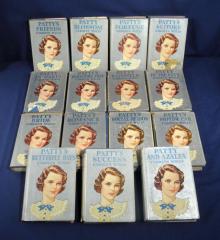 Patty's Social Season
Patty's Social Season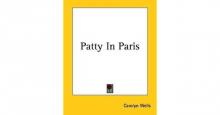 Patty in Paris
Patty in Paris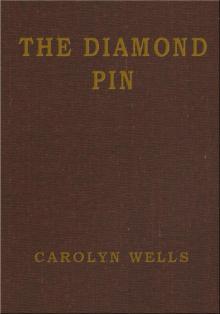 The Diamond Pin
The Diamond Pin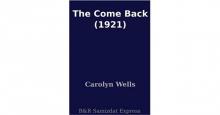 The Come Back
The Come Back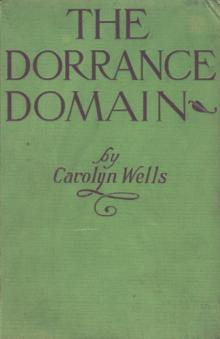 The Dorrance Domain
The Dorrance Domain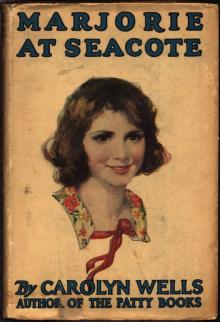 Marjorie at Seacote
Marjorie at Seacote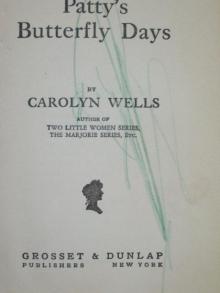 Patty's Butterfly Days
Patty's Butterfly Days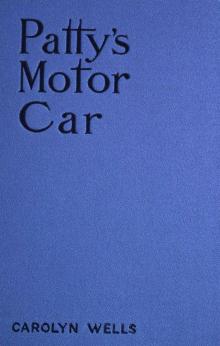 Patty's Motor Car
Patty's Motor Car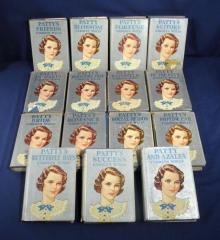 Patty's Success
Patty's Success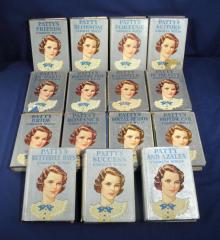 Patty's Suitors
Patty's Suitors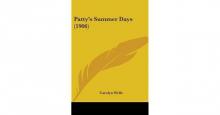 Patty's Summer Days
Patty's Summer Days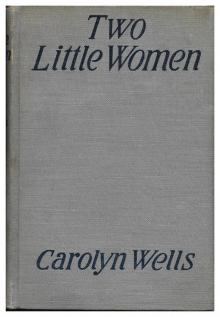 Two Little Women
Two Little Women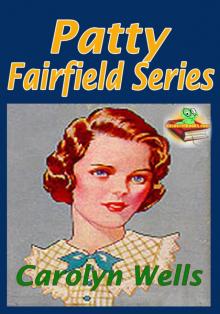 Patty Fairfield
Patty Fairfield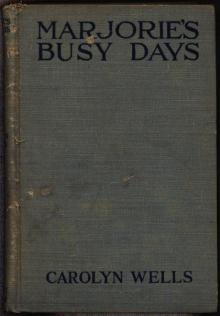 Marjorie's Busy Days
Marjorie's Busy Days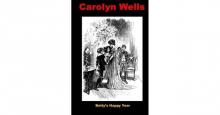 Betty's Happy Year
Betty's Happy Year In the Onyx Lobby
In the Onyx Lobby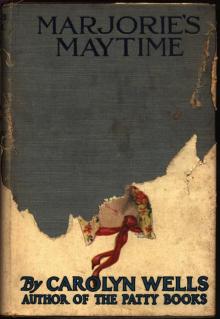 Marjorie's Maytime
Marjorie's Maytime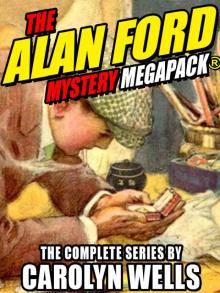 The Alan Ford Mystery MEGAPACK®
The Alan Ford Mystery MEGAPACK®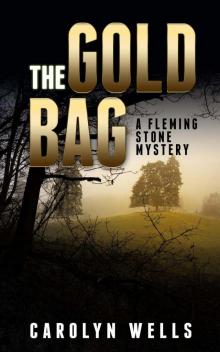 The Gold Bag
The Gold Bag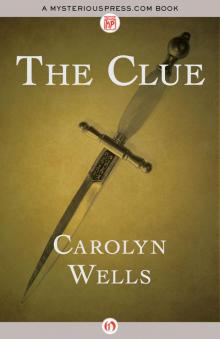 The Clue
The Clue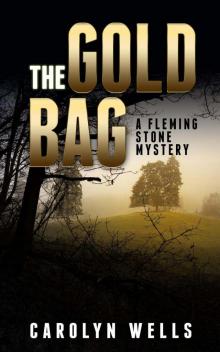 The Gold Bag : A Fleming Stone Mystery
The Gold Bag : A Fleming Stone Mystery